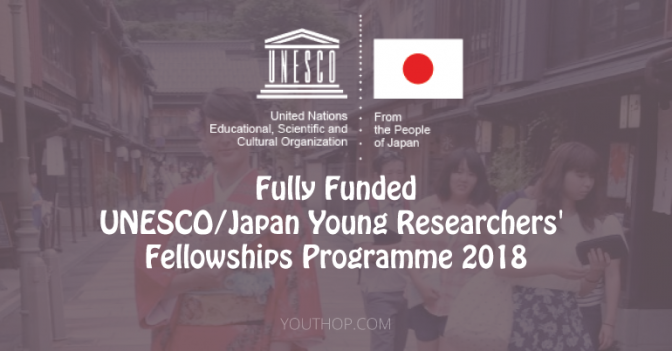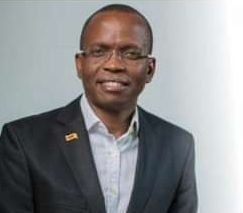UNESCO/Japan Young Researchers’ Fellowship Programme

UNESCO/Japan Young Researchers’ Fellowship Programme
The new UNESCO/Keizo Obuchi Research Fellowships Programme (UNESCO/Japan Young Researchers’ Fellowship Programme) is now available on offer for researchers of Developing Countries. This fellowship is offered by Government of Japan.
The aim of the fellowships is to support innovative and imaginative post-graduate research in four areas of development of particular interest to UNESCO.
The UNESCO/Keizo Obuchi Research Fellowships Programme (UNESCO/Japan Young Researchers’ Fellowship Programme) funded under the Japanese Funds-in-Trust for the capacity-building of Human Resources will aim, in particular, to impact on capacity-building and research activities in the following areas: 1. Environment (with particular attention on disaster risk reduction (DRR); 2. Intercultural Dialogue; 3. Information and Communication Technologies; and 4. Peaceful conflict resolution. No other research topics will be considered.
Location: Japan
BenefitsScholarship Award: The Fellowships financed by Japan and administered by UNESCO will consist of the following: A Lump sum contribution of US$10,000 will be awarded to selected candidates. The amount, to be paid in two or three instalments, is intended to cover research costs only, and will not be negotiable. No other costs will be considered and grants will be neither extended nor renewed.Nationality: This fellowship is available for researchers of Developing Countries.Number of Scholarships: The Government of Japan offers 10 fellowships.Scholarship can be taken in In one or two countries
It should be understood that at the end of the Fellowship, the beneficiary must agree to return to his/her home country so that knowledge acquired may be put to good use in local research and training programmes.
Eligibilities
Please check the official website for detail eligibilities.
Eligible Regions: Afghanistan, Algeria, Angola, Antigua and Barbuda, Argentina, Armenia, Azerbaijan, Bahamas, Bahrain Bangladesh, Barbados, Belarus, Belize, Benin, Bhutan, Bolivia, Bosnia and Herzegovina, Botswana, Brazil, Brunei, Bulgaria, Burkina Faso, Burma, Burundi, Cambodia, Cameroon, Cape Verde, Central African, Republic Chad, Chile, People’s Republic of China, Colombia, Comoros, Democratic Republic of the Congo, Republic of the Congo, Costa Rica, Ivory Coast, Croatia, Djibouti, Dominica, Dominican Republic, Ecuador, Egypt, El Salvador, Equatorial Guinea, Eritrea, Ethiopia, Fiji, Gabon, The Gambia, Georgia, Ghana, Grenada, Guatemala, Guinea, Guinea, Bissau, Guyana, Haiti, Honduras, Hungary, Indonesia, India, Iran, Iraq, Jamaica, Jordan, Kazakhstan, Kenya, Kiribati, Kuwait, Kyrgyzstan, Laos, Latvia, Lebanon, Lesotho, Liberia, Libya, Lithuania, Macedonia, Madagascar, Malawi, Malaysia, Maldives, Mali, Marshall Islands, Mauritania, Mauritius, Mexico, Federated States of Micronesia, Moldova, Mongolia, Montenegro, Morocco, Mozambique, Namibia, Nauru, Nepal, Nicaragua, Niger, Nigeria, Oman, Pakistan, Palau, Panama, Papua New Guinea, Paraguay, Peru, Philippines, Poland, Qatar, Romania, Russia, Rwanda, Saudi Arabia, Samoa, São Tomé and Príncipe, Senegal, Serbia, Seychelles, Sierra Leone, Solomon Islands, South Africa, Somalia, Sri Lanka, Saint Kitts and Nevis, Saint Lucia, Saint- Vincent and the Grenadines, South Sudan, Sudan, Suriname, Swaziland, Syria, Tajikistan, Tanzania, Thailand, Timor Leste, Togo, Tonga, Trinidad and Tobago, Tunisia, Turkey, Turkmenistan, Tuvalu, Uganda, Ukraine, United Arab Emirates, Uruguay, Uzbekistan, Vanuatu, Venezuela, Vietnam, Yemen, Zambia and Zimbabwe
APPLICATION PROCESS
How to Apply: All applications must be submitted with the required documentation on the UNESCO Fellowship Application Form. Each Member State may nominate a maximum of two (2) candidates. It is the National Commission’s responsibility to select th



